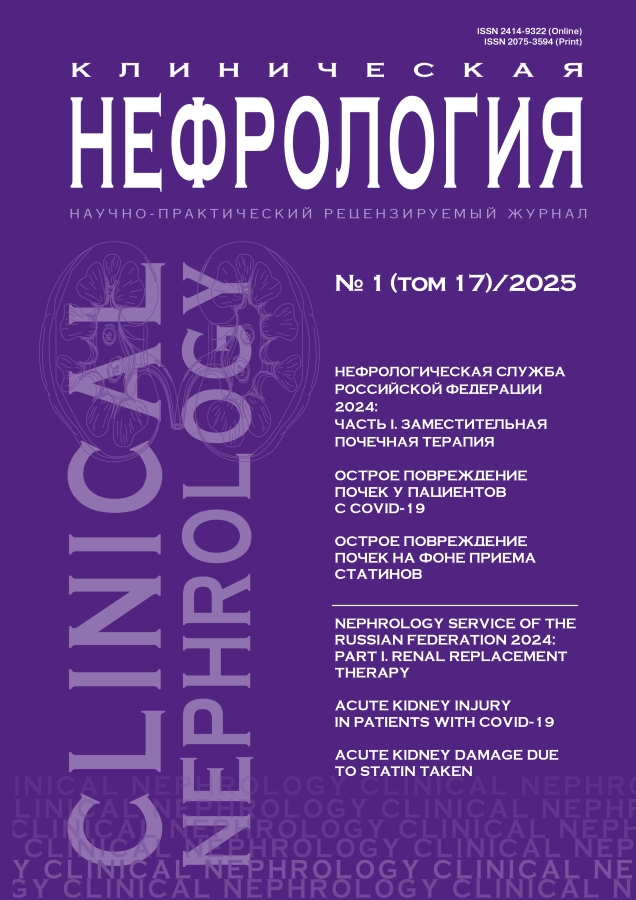Анализ демографических, клинических и лабораторных показателей у пациентов с COVID-19 с острым повреждением почек
- Авторы: Абдурахимов А.Х.1
-
Учреждения:
- Андижанский государственный медицинский институт
- Выпуск: Том 17, № 1 (2025)
- Страницы: 33-36
- Раздел: Оригинальные статьи
- URL: https://journals.eco-vector.com/2075-3594/article/view/679270
- DOI: https://doi.org/10.18565/nephrology.2025.1.33-36
- ID: 679270
Цитировать
Полный текст
Аннотация
Цель исследования: улучшить понимание предикторов риска почечных осложнений у пациентов, перенесших COVID-19, с сахарным диабетом (СД) и без него, что позволит разработать эффективные стратегии профилактики и лечения.
Материал и методы. В исследовании участвовали 386 пациентов, которые были разделены на группы в зависимости от скорости клубочковой фильтрации (СКФ), рассчитанной с использованием формулы CKD-EPI. Пациенты были классифицированы как имеющие нормальную функцию почек (≥90 мл/мин/1,73 м2) и нарушенную функцию почек (≤89 мл/мин/1,73 м2).
Результаты. Пациенты с нарушенной функцией почек были значительно старше, имели больший индекс массы тела (ИМТ) и степень поражения легких по сравнению с пациентами с нормальной функцией почек. У пациентов с пониженным уровнем СКФ наблюдались гематологические отклонения, такие как повышенный уровень гематокрита и сниженное число лимфоцитов. Эти изменения были особенно выражены у мужчин и пациентов с СД, что указывает на возможное воспалительное и метаболическое влияние на повреждение почек в этих группах.
Заключение. Пожилой возраст, повышенный ИМТ и большая степень поражения легких являются значимыми предикторами почечного повреждения у пациентов, перенесших COVID-19, особенно у больных СД. Регулярная оценка СКФ и раннее управление воспалительными процессами могут быть ключевыми в предотвращении почечных осложнений у пациентов этой категории.
Полный текст
Об авторах
Абдухалим Холиддин угли Абдурахимов
Андижанский государственный медицинский институт
Автор, ответственный за переписку.
Email: abduhalimaka@mail.ru
ORCID iD: 0000-0003-4541-0436
ассистент кафедры
Узбекистан, АндижанСписок литературы
- Jewell P.D., Bramham K., Galloway J., et al. COVID-19-related acute kidney injury; incidence, risk factors and outcomes in a large UK cohort. BMC. Nephrol. 2021;22:359. Doi: https://doi.org/10.1186/s12882-021-02557-x.
- Sohrabi M.R., Amin R., Maher A., et al. Sociodemographic determinants and clinical risk factors associated with COVID-19 severity: a cross-sectional analysis of over 200,000 patients in Tehran, Iran. BMC. Infect. Dis. 2021;21:474. Doi: https://doi.org/10.1186/s12879-021-06179-4.
- Wang Q., Cheng J., Shang J., et alClinical value of laboratory indicators for predicting disease progression and death in patients with COVID-19: a retrospective cohort study. BMJ. Open. 2021;11:e043790. doi: 10.1136/bmjopen-2020-043790.
- Lowe R., Ferrari M., Nasim-Mohi M., et al. Clinical characteristics and outcome of critically ill COVID-19 patients with acute kidney injury: a single centre cohort study. BMC. Nephrol. 2021;22:92. Doi: https://doi.org/10.1186/s12882-021-02296-z.
- de Almeida D.C., Franco M.D.C.P., Dos Santos D.R.P., et al. Acute kidney injury: Incidence, risk factors, and outcomes in severe COVID-19 patients. PLoS One. 2021;16(5):e0251048. doi: 10.1371/journal.pone.0251048. [PMID: 34033655, PMCID: PMC8148326].
- Chidambaram V., Tun N.L., Haque W.Z., et al. Factors associated with disease severity and mortality among patients with COVID-19: A systematic review and meta-analysis. PLoS One. 2020;15(11):e0241541. doi: 10.1371/journal.pone.0241541. [PMID: 33206661, PMCID: PMC7673562].
- Yang Q., Yang X. Incidence and risk factors of kidney impairment on patients with COVID-19: A meta-analysis of 10180 patients. PLoS One. 2020;15(11):e0241953. doi: 10.1371/journal.pone.0241953. [PMID: 33196669, PMCID: PMC7668576].
- Lin L., Wang X., Ren J., et al. Risk factors and prognosis for COVID-19-induced acute kidney injury: a meta-analysis. BMJ. Open. 2020;10(11):e042573. doi: 10.1136/bmjopen-2020-042573. [PMID: 33172950, PMCID: PMC7656886].
- Abdurakhimov A., Kakharov Z. Pathogenetic role of coronavirus infection in the devel-opment of acute kidney injury. Am. J. Med. Med. Sci. 2024;14(6): 1673–9. Doi: https://doi.org/10.5923/j.ajmms.20241406.44.
- Shlipak M.G., Tummalapalli S.L., Boulware L.E., et al. Conference Participants. The case for early identification and intervention of chronic kidney disease: conclusions from a Kidney Disease: Improving Global Outcomes (KDIGO) Controversies Conference. Kidney Int. 2021;99(1):34–47. doi: 10.1016/j.kint.2020.10.012. [Epub 2020 Oct 27, PMID: 33127436].
- Anaya J.M., Rojas M., Salinas M.L., et al. Post-COVID study group; Monsalve DM, Acosta-Ampudia Y, Ramírez-Santana C. Post-COVID syndrome. A case series and comprehensive review. Autoimmun. Rev. 2021;20(11):102947. doi: 10.1016/j.autrev.2021.102947. [Epub 2021 Sep 10, PMID: 34509649, PMCID: PMC8428988].
- Kidney Disease: Improving Global Outcomes (KDIGO) CKD Work Group. KDIGO 2024 Clinical Practice Guideline for the Evaluation and Management of Chronic Kidney Disease. Kidney Int. 2024;105(4S):S117–314. doi: 10.1016/j.kint.2023.10.018. [PMID: 38490803].
- Messersmith J., Stoddart-Osumah C., Lennon M., Wirtz D. Emergency seed funding for COVID-19 research: lessons from Johns Hopkins University. J. Clin. Invest. 2021;131(1):e145615. doi: 10.1172/JCI145615. [PMID: 33170810, PMCID: PMC7773385].
Дополнительные файлы








